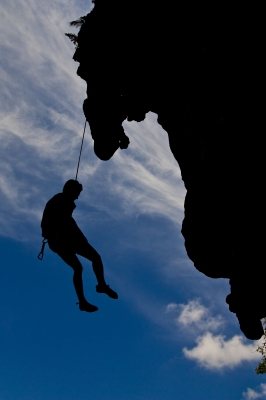 Climber Dallin Smith and his girlfriend
Climber Dallin Smith and his girlfriend are depicted chilling out in their self-made lawn chairs that they attached 350 feet high on a cliff wall in Utah. You can look at the amazing pictures
here. Smith weaved his own lawn chairs and explains "the springs aren’t bolted in. They just rest nicely in a crack." Did someone say "death wish"?
It might be one of the biggest paradoxes of our generation of parents and fits Generation X to a tee. Generation X'ers are rough and tough pragmatists born into the cultural chaos of a new social operating system. Many of us have made it our life project to create order out of disorder, of which a great part goes through over-protecting our children from various harms. At the same time we have established and popularized leisure time activities and entertainment concepts that have far more in common with roman gladiator shows than with
Yo Gabba Gabba. Pretend for a moment that you are a martian witnessing the bizarre behavior of a middle-aged guy who is imposing on himself the trauma of a 10-mile military training circuit carrying a 35 lbs rucksack, military boots, going through mud, ice baths, barbed wire and electric shocks. Upon returning home all bloody and sweaty, he reunites with his little princess whom he never lets out of sight lest she stumbles and skins her knee while he turns his muscular back for a split second. You will catch him carefully examining her Halloween candy for poison and razor blades which she received at her neighbor's doors while his watchful eyes followed her trick-or-treating from the safe distance of the sidewalk curb. "You just never know." And after dishing out his hard earned money to earn whipping commands from his ruthless bootcamp instructor at 5 am, God forbid if his children's coaches ruffle their feathers or fails to hand them a trophy at the end of the season, regardless of performance.
 Climber Dallin Smith and his girlfriend are depicted chilling out in their self-made lawn chairs that they attached 350 feet high on a cliff wall in Utah. You can look at the amazing pictures here. Smith weaved his own lawn chairs and explains "the springs aren’t bolted in. They just rest nicely in a crack." Did someone say "death wish"?
It might be one of the biggest paradoxes of our generation of parents and fits Generation X to a tee. Generation X'ers are rough and tough pragmatists born into the cultural chaos of a new social operating system. Many of us have made it our life project to create order out of disorder, of which a great part goes through over-protecting our children from various harms. At the same time we have established and popularized leisure time activities and entertainment concepts that have far more in common with roman gladiator shows than with Yo Gabba Gabba. Pretend for a moment that you are a martian witnessing the bizarre behavior of a middle-aged guy who is imposing on himself the trauma of a 10-mile military training circuit carrying a 35 lbs rucksack, military boots, going through mud, ice baths, barbed wire and electric shocks. Upon returning home all bloody and sweaty, he reunites with his little princess whom he never lets out of sight lest she stumbles and skins her knee while he turns his muscular back for a split second. You will catch him carefully examining her Halloween candy for poison and razor blades which she received at her neighbor's doors while his watchful eyes followed her trick-or-treating from the safe distance of the sidewalk curb. "You just never know." And after dishing out his hard earned money to earn whipping commands from his ruthless bootcamp instructor at 5 am, God forbid if his children's coaches ruffle their feathers or fails to hand them a trophy at the end of the season, regardless of performance.
Climber Dallin Smith and his girlfriend are depicted chilling out in their self-made lawn chairs that they attached 350 feet high on a cliff wall in Utah. You can look at the amazing pictures here. Smith weaved his own lawn chairs and explains "the springs aren’t bolted in. They just rest nicely in a crack." Did someone say "death wish"?
It might be one of the biggest paradoxes of our generation of parents and fits Generation X to a tee. Generation X'ers are rough and tough pragmatists born into the cultural chaos of a new social operating system. Many of us have made it our life project to create order out of disorder, of which a great part goes through over-protecting our children from various harms. At the same time we have established and popularized leisure time activities and entertainment concepts that have far more in common with roman gladiator shows than with Yo Gabba Gabba. Pretend for a moment that you are a martian witnessing the bizarre behavior of a middle-aged guy who is imposing on himself the trauma of a 10-mile military training circuit carrying a 35 lbs rucksack, military boots, going through mud, ice baths, barbed wire and electric shocks. Upon returning home all bloody and sweaty, he reunites with his little princess whom he never lets out of sight lest she stumbles and skins her knee while he turns his muscular back for a split second. You will catch him carefully examining her Halloween candy for poison and razor blades which she received at her neighbor's doors while his watchful eyes followed her trick-or-treating from the safe distance of the sidewalk curb. "You just never know." And after dishing out his hard earned money to earn whipping commands from his ruthless bootcamp instructor at 5 am, God forbid if his children's coaches ruffle their feathers or fails to hand them a trophy at the end of the season, regardless of performance.






